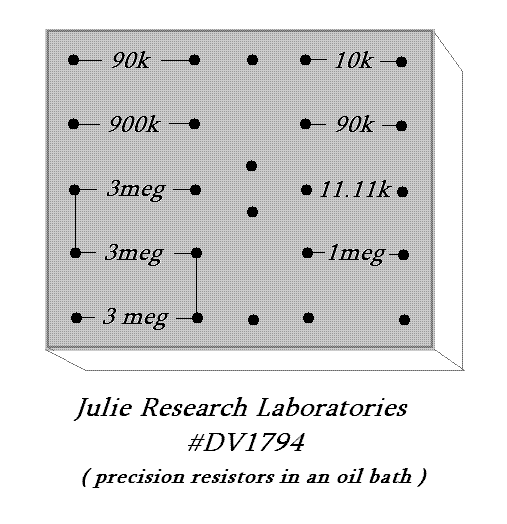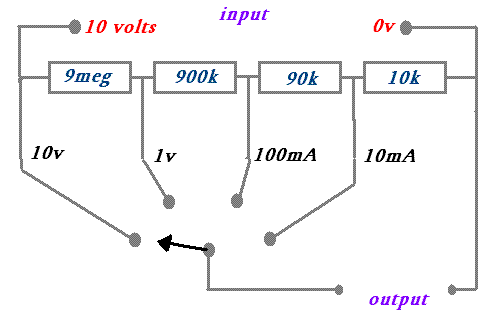This is for the old-school test junkies...
I bought a precision resistor set, encased in an oil bath.

I know that the 3 megs in series is 9meg...which gives me a standard DC decade voltage divider when tapped between these resistors in series...(with an overall impedance of 10 meg. )

But.... what about the other resistors ? I don't recognize them as part of a standard configuration.
Do you ?
=RR=
I bought a precision resistor set, encased in an oil bath.

I know that the 3 megs in series is 9meg...which gives me a standard DC decade voltage divider when tapped between these resistors in series...(with an overall impedance of 10 meg. )

But.... what about the other resistors ? I don't recognize them as part of a standard configuration.
Do you ?
=RR=
It also works this way, but with the 9 meg resistor near the 0v (ground). I don't know if there is a difference. ??
http://i5.photobucket.com/albums/y177/Midiot/dv1794_schem_v2.gif
=RR=
http://i5.photobucket.com/albums/y177/Midiot/dv1794_schem_v2.gif
=RR=
11k11+10k+90k+90k+900k+10M=11M10111.
if the empty space is filled with 10k then 11k11/11M11111=-120dB
if the empty space is filled with 10k then 11k11/11M11111=-120dB
@AndrewT:
Well, ~11k divided by ~11M is ~1/1000 which would be round about -60dB(!) (more or less exactly -59.993...dB) and not -120dB(?).
However you point in the correct direction!
@redrabbit:
If you put 11k11+10k+90k in series and measure the voltage across the 11k11 you get -20dB (-20.00078...dB). There supposed to be a few more combinations, but because of lack of exercises with such a resistor 'array', I forgot most of the other combinations. So please excuse me.
However, in the days of computers it should be quite easy to figure out all other possible combinations for the dB-scale. And as far as I remember a connection table should be provided with that box, so you don't have to reinvent/recalculate all possible/usefull combinations. But once your PC has calculated all combinations ... (keep that table for any further use).
Anyhow - good luck.
Well, ~11k divided by ~11M is ~1/1000 which would be round about -60dB(!) (more or less exactly -59.993...dB) and not -120dB(?).
However you point in the correct direction!
@redrabbit:
If you put 11k11+10k+90k in series and measure the voltage across the 11k11 you get -20dB (-20.00078...dB). There supposed to be a few more combinations, but because of lack of exercises with such a resistor 'array', I forgot most of the other combinations. So please excuse me.
However, in the days of computers it should be quite easy to figure out all other possible combinations for the dB-scale. And as far as I remember a connection table should be provided with that box, so you don't have to reinvent/recalculate all possible/usefull combinations. But once your PC has calculated all combinations ... (keep that table for any further use).
Anyhow - good luck.
- Status
- Not open for further replies.